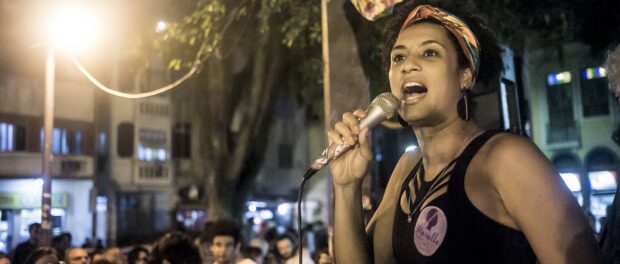
Today—Thursday, March 14, 2019—marks the one-year anniversary of the politically-motivated murder of former city councilor Marielle Franco and her driver Anderson Gomes. The 365-day-long investigation has been secretive and largely ineffective.
I could fill you in on details of the case as it unfolds, from the route taken on the night of the crime to the murder weapon—which was an HK MP5 submachine gun, typically used by the elite force of Rio’s police, loaded with ammunition that has been traced to the Federal Police in Brasília. But I won’t. I want to talk about how in Brazil, spaces of political power cannot deal with black people and their demands, voiced in the first person. This is especially the case for black women from the periphery.
The Brazilian political system, which originated in the colonial period, is composed of a majority of wealthy white men who are interested in privatizing public goods, exponentially increasing their own wealth, and using their privilege to the detriment of the quality of life of the working class.
Of course, there are a few exceptions. Elected as a city councilor with 46,000 votes in the city of Rio de Janeiro, Marielle was a black woman, mother, and sociologist raised in Complexo da Maré. She was assassinated precisely for being a black woman from the periphery who was familiar with the needs of the working class and committed to working on their behalf in political spaces where others have historically spoken for us but cannot stand to hear us speak for ourselves.
Marielle was undoubtedly instrumental in debunking the myth that human rights serve as a tool to benefit criminals. In the city of Rio, geography dictates whether a person is deemed worthy of their rights or deemed to be a potential criminal based on their physical appearance. Marielle fought to humanize these individuals. Her greatest mission was to democratize the rule of law for favela residents.
In a country where diversity is celebrated and marketed internationally through a folkloric narrative, symbolic limits are subjectively imposed on the spaces that can be occupied by black bodies. As a black woman from a favela, I’ve been told countless times by friends and family that I’m too opinionated, that I study too much, that I know too much, and that I would be better off focusing my time and energy on applying for an administrative job.
The silencing and erasure of the existence of black intellect no accident. It is a project. In school, we did not study other figures like Marielle in class. If it weren’t for samba, which reveals stories otherwise repressed by the elite to an international audience, we would have been condemned to die—physically, intellectually, and symbolically.
Thank you Mangueira Samba School for this year’s Carnaval!
This month—marked by the celebration of International Women’s Day and the one-year anniversary of the murder of Marielle Franco and Anderson Gomes—it is important to acknowledge the black women who continue to resist in the government chambers on a daily basis. We hope that Talíria Petrone, Renata Souza, Monica Francisco, Benedita da Silva, and many others have the strength and clarity to continue representing us in these spaces. The presence of black women in spaces of political decision-making, albeit in tiny percentages, is extremely important for our cause.
To all women: I wish we did not have to die in order to rise! This shouldn’t be the only way to fulfill our destinies, to have our actions and words legitimized. We deserve recognition—in the streets and in life—as long as we are alive. May we have persistence and clarity as we continue entering and re-signifying spaces that have been denied to us.
I dedicate this text to the memory of Marielle Franco, with the certainty that her name will never be erased from history. I also dedicate it to my aunt Diva—murdered in 1998 by her former partner, whose freedom is justified to this day by an ineffective system that is complicit in the death of black women.
Mayara Ximenes is a resident of Morro do Engenho da Rainha. She is a journalism student, has worked in the field of communications for about five years, and is the creator and content producer of Boca de Favela—a communication project that features plural narratives about residents of Rio de Janeiro’s favelas narrated in the first person.


